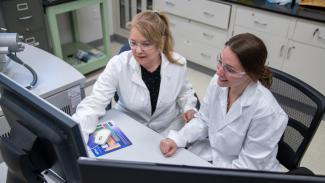Collaboration is a proven method to create an outcome that is greater than the sum of its parts. Charles Darwin: “In the long history of humankind (and animal kind, too) those who learned to collaborate and improvise most effectively have prevailed.” Collaboration is a route to progress and success.
This is especially true in research, where the knowledge and ideas of an expert in one field, can inspire and inform the perspective of an expert in another field, and their combined insight becomes a powerful force in tackling challenges and creating solutions for seemingly unsolvable problems.
At NETL, we know that collaboration is key. From our multidisciplinary teams across our research sites, to the productive partnerships we pursue with universities, industry and other research entities around the world, our success is built on collaboration. That’s why we’re so thrilled to host research associates with the Mickey Leland Energy Fellowship (MLEF) and Consortium for Integrating Energy Systems in Engineering and Science Education (CIESESE) each summer at our labs in Albany, Oregon; Morgantown, West Virginia; and Pittsburgh.
The MLEF and CIESESE programs improve opportunities for under-represented students in STEM fields and strengthen a diverse cadre of future STEM professionals. The MLEF program has mentored several hundred talented students from across the nation and provided participants the unique opportunity to gain hands-on research experience with fossil energy. The CIESESE program directly supports DOE's goal to build a sustainable professional and academic pipeline, particularly professionals from the Hispanic community, ready to take on the challenges of current and future energy systems.
Here a few examples of how this summer’s participants are making a difference in energy research:
- Morgan Olsen and mentor Circe Verba, Ph.D., are collaborating on coupling 2D and 3D image analysis and microscopy to understand geochemistry and mechanisms of natural and synthetic materials, such as underclay and coal byproducts. The goal of this advanced characterization technique is to understand the distribution of rare earth elements and pore space.
- Brianna O’Neil-Hankle is performing research with mentor Christina Lopano, Ph.D., on a project designed to improve our understanding of pH conditions in which rare earth elements are found with different metals in acid mine drainage passive remediation solids. The project is helping to inform trends of light rare earths, heavy rare earths and other critical metals of interest for potential recovery in coal waste systems.
- Charity Betters and Jamie Vornlacher, under the guidance of mentors Johnathan Moore and Dustin Crandall, are operating a multi-sensor core logger to obtain detailed petrophysical properties of various samples. Betters is studying a salt rock geological formation that might be used for nuclear waste storage, and Vornlacher is studying a Bass Island formation that is used as a reservoir for carbon storage. The data from both projects will be compiled into a geologic interpretation.
Internship programs like the MLEF and CIESESE are critical to meeting our nation’s energy goals because research is a long-term effort. Research projects take years, even decades, and it’s a multi-researcher problem, requiring the expertise and diligence of many scientists and several generations. At NETL, we seek to discover, integrate and mature technology solutions to enhance the nation’s energy foundation and protect the environment for future generations. These are big, long-term challenges that require many different skill sets, many perspectives, and many researchers to address — diversity is imperative. The discoveries and innovations we forge together are proving technology solutions for today and options for tomorrow. As author and political activist Helen Keller observed: “Alone we can do so little; together we can do so much.”
MLEF and CIESESE are just two examples of NETL’s graduate education programs. The Lab also offers a Professional Internship Program, Postgraduate Research Program and Faculty Research Program, among others. To learn more about NETL’s internship opportunities, please visit: https://www.netl.doe.gov/education/internship




